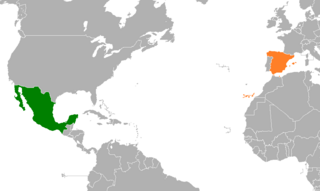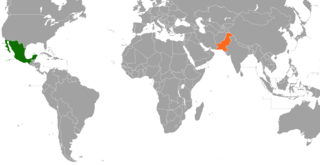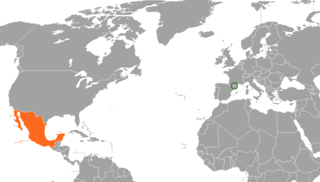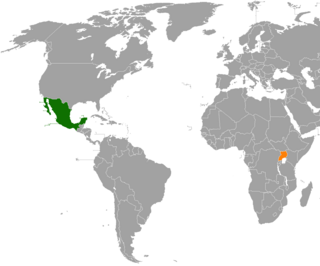 | |
Afghanistan | Mexico |
|---|---|
Afghanistan and Mexico hold diplomatic relations, both being members of the United Nations and the World Trade Organization.
 | |
Afghanistan | Mexico |
|---|---|
Afghanistan and Mexico hold diplomatic relations, both being members of the United Nations and the World Trade Organization.
Due to a vast distance between Afghanistan and Mexico, the relation between the two nations never developed into one of high priority. Both nations established diplomatic ties on the 27 June 1961. Since then, bilateral relations are mainly conducted at international forums such as the United Nations. [1]
In 1962, Mexico accredited its first ambassador to Afghanistan, resident in New Delhi, India. The ambassador was Nobel Prize winner Octavio Paz. [2] During Paz's time as ambassador in India, he kept a journal of his travels to Afghanistan writing about his journey from New Delhi to Kabul and his experiences and he documented presenting his credentials to former Afghan King Mohammed Zahir Shah. Paz turned his journal into a book called "Viento Entero." [2]
From 1980 to 1981, Mexico was on the United Nations Security Council and voted in favor of Resolution 462 condemning the Soviet invasion of Afghanistan. The Resolution was adopted. When Mexico was again a member of the UN Security Council from 2002 to 2003; it voted on numerous occasions in favor of maintaining Afghanistan's independence and sovereignty of the country (Resolution 1444 and Resolution 1453) and extending the UN Assistance Mission mandate in the country (Resolution 1471). From 2009 to 2010, Mexico again as a non-permanent member of the UN Security Council voted in favor of UN Resolution 1868 and UN Resolution 1890. [3]
Since the beginning of the U.S led invasion of Afghanistan in 2001; many Afghan migrants have travelled to Mexico in order to enter the United States. [4] Furthermore, several Mexican narcotic cartels have been operating in Afghanistan by using fake "front" companies to hire smugglers in the country to smuggle drugs and weapons from Afghanistan to Europe and the United States. [5]
Throughout the years, several Afghan migrants have traveled through Mexico to reach the United States and are forced to wait in Mexico while their U.S. asylum cases are reviewed and processed. [6]
In August 2021, with the return of control of the Taliban in Afghanistan; Mexico announced it would issue refugee visas to Afghan refugees, in particular women and children, from its embassy in Tehran, Iran and resettle them in Mexico. [7] Immediately afterwards, over 100 Afghan refugees arrived to Mexico. [8] Afghanistan's embassy in the United States was accredited to Mexico until it closed on March 16, 2022. [9] [10] The Mexican Embassy in Tehran is accredited to Afghanistan.
In 2018, bilateral trade between Afghanistan and Mexico amounted to US$9 million. [11] Afghanistan is Mexico's 165th biggest global trading partner while at the same time, Mexico is Afghanistan's 63rd biggest trading partner. [3] Afghanistan's main exports to Mexico include: mobile phones, machine and automobile parts. Mexico's main exports to Afghanistan include: refrigerators, beer, plastic and silicone. [3]
Colombia seeks diplomatic and commercial relations with all countries, regardless of their ideologies or political or economic systems. For this reason, the Colombian economy is quite open, relying on international trade and following guidelines given by international law.
The foreign relations of Afghanistan are in a transitional phase since the 2021 fall of Kabul to the Taliban and the collapse of the internationally-recognized Islamic Republic of Afghanistan. No country has recognised the new regime, the Islamic Emirate of Afghanistan. Although some countries have engaged in informal diplomatic contact with the Islamic Emirate, formal relations remain limited to representatives of the Islamic Republic.

The foreign relations of Mexico are directed by the President of the United Mexican States and managed through the Secretariat of Foreign Affairs. The principles of the foreign policy are constitutionally recognized in the Article 89, Section 10, which include: respect for international law and legal equality of states, their sovereignty and independence, non-intervention in the domestic affairs of other countries, peaceful resolution of conflicts, and promotion of collective security through active participation in international organizations. Since the 1930s, the Estrada Doctrine has served as a crucial complement to these principles.

Australia–Mexico relations are the bilateral relations between the Commonwealth of Australia and the United Mexican States. Both nations are members of the Asia-Pacific Economic Cooperation, Comprehensive and Progressive Agreement for Trans-Pacific Partnership, G20, MIKTA, Organisation for Economic Co-operation and Development and the World Trade Organization.

Antigua and Barbuda maintains diplomatic relations with the United States, Canada, the United Kingdom, and the People's Republic of China, as well as with many Latin American countries and neighbouring Eastern Caribbean states. It is a member of the United Nations, the Commonwealth of Nations, the Organization of American States, the Organisation of Eastern Caribbean States, the Bolivarian Alliance for the Americas, Petrocaribe and the Eastern Caribbean's Regional Security System (RSS).

Ties between Mexico and Spain date back to the Spanish conquest of Mexico in 1519 and subsequent Spanish colonialism in the country which lasted until the end of the Mexican War of Independence in 1821. Formal diplomatic relations between both nations commenced in 1836 and were severed with the aftermath of the Spanish Civil War in 1939. Diplomatic relations were re-established in 1977 and have continued unabated since.

Ireland–Mexico relations are the foreign relations between Ireland and Mexico. The relationship has been often associated with the Irish migration to Mexico. Both nations are members of the Organisation for Economic Co-operation and Development, and World Trade Organization.

Mexico–Sahrawi Republic relations are the current and historical relations between Mexico and the Sahrawi Arab Democratic Republic (SADR). Mexico recognized the SADR on 8 September 1979.

Lebanon–Mexico relations are the diplomatic relations between Lebanon and Mexico. Both nations enjoy friendly relations, the importance of which centers on the history of Lebanese immigration to Mexico. Both nations are members of the Group of 24 and the United Nations.

Angola–Mexico relations are the diplomatic relations between the Republic of Angola and the United Mexican States. Both nations are members of the United Nations. Neither country has a resident ambassador.

Mexico–Pakistan relations are the diplomatic relations between Mexico and Pakistan. Both nations are members of the United Nations and the World Trade Organization.

Mexico–North Korea relations are the current and historical relations between Mexico and North Korea. In 2017, there were 366 North Koreans residing in Mexico.

The nations of Belarus and Mexico established diplomatic relations in 1992. Both nations are members of the United Nations.

Iraq–Mexico relations are the diplomatic relations between the Republic of Iraq and the United Mexican States. Both nations are members of the United Nations.

The nations of Andorra and Mexico established diplomatic relations in 1995. Both nations are members of the Organization of Ibero-American States and the United Nations.

Mexico–Uganda relations are the diplomatic relations between the United Mexican States and the Republic of Uganda. Both nations are members of the United Nations.

DR Congo–Mexico relations are the diplomatic relations between the Democratic Republic of the Congo and the United Mexican States. Both nations are members of the Group of 24 and the United Nations.

Mexico–Syria relations are the diplomatic relations between the United Mexican States and the Syrian Arab Republic. Both nations are founding members of the United Nations.